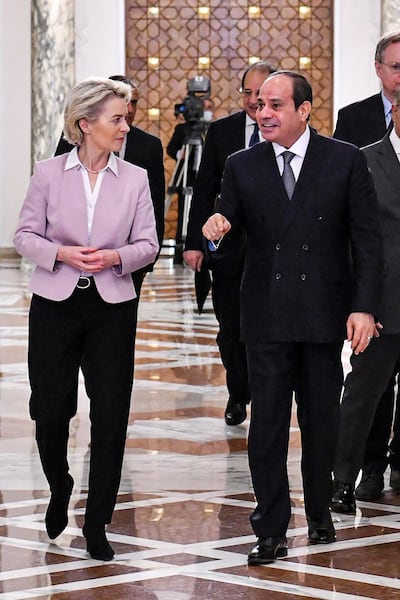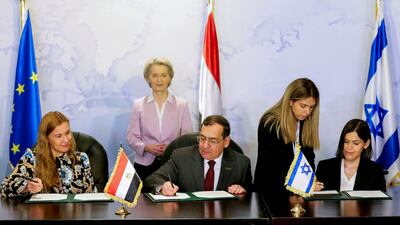Egypt, Israel and the EU signed a preliminary agreement on Wednesday to increase liquefied natural gas (LNG) sales to Europe, which has been seeking ways to reduce its dependence on Russian gas.
As part of the deal, Israel will send more gas through Egypt, which has facilities to liquefy it for export to EU countries across the Mediterranean, European Commission President Ursula von der Leyen said.
The agreement, signed in Cairo, is part of Europe’s efforts to diversify energy sources away from Russia, following Moscow's military offensive in Ukraine, and import hydrocarbons from “other trustworthy suppliers”, she said.
Egypt and Israel have grown as gas exporters in recent years following major offshore discoveries in the East Mediterranean.
It was not immediately clear how much gas the EU will import from either Israel or Egypt.
Russia is the world's second-largest energy exporter, accounting for about 10 per cent of the world’s energy output, including 17 per cent of its natural gas and 12 per cent of its oil.
Last year, the EU imported about 40 per cent of its gas from Russia, but the bloc aims to gradually reduce its reliance on Moscow as part of sanctions imposed on the country.

Late last month, the EU's 27 member states agreed to stop crude oil shipments from Russia but to leave pipelines open. Ukraine and some EU member states have urged the bloc's leaders to tackle the subject of natural gas imports, but the union is particularly reliant on Russia in that field.
Ms von der Leyen said at the time that she hoped to put about 300 billion euros ($321bn) of EU funding behind a blanket energy revamp stretching from Finland to Portugal to support the move away from its reliance on Russia.
In March, the US also said it would ensure additional LNG volumes for the EU market of at least 15 billion cubic metres in 2022, with expected increases going forward.

Speaking on Wednesday, Ms von der Leyen stressed that the agreement with Egypt and Israel would help the transition.
“I want to thank you because this comes at a time that is very difficult for the EU, and indeed we are experiencing again a war on European soil and therefore, we are now in the process of completely diversifying our energy supplies away from Russian fossil fuels and towards other trustworthy suppliers,” she said.
Israeli Energy Minister Karine Elharrar said at the signing ceremony: “Today we make history, today Egypt and Israel together made a commitment to share our natural gas with Europe and help with its energy crisis.”

